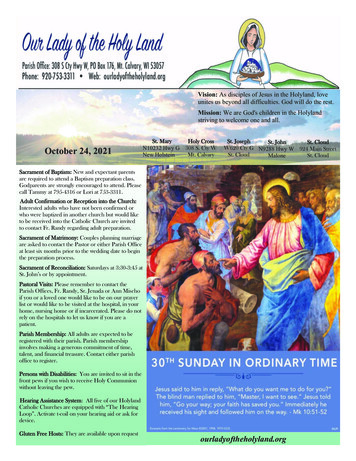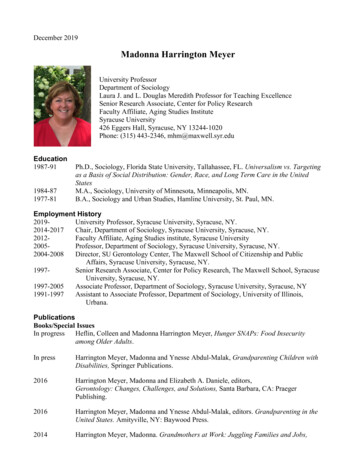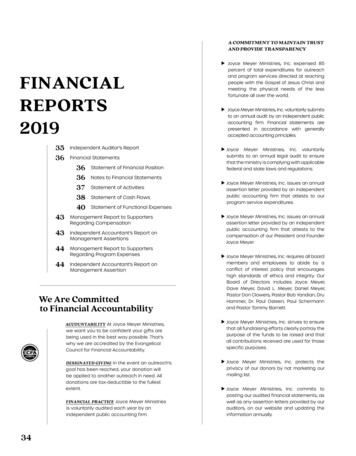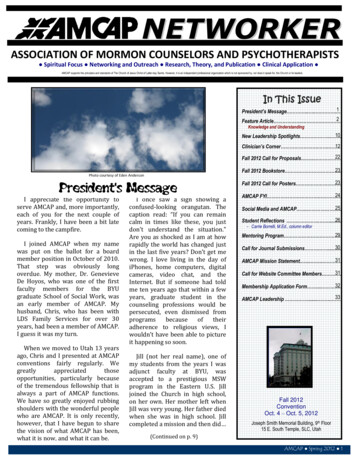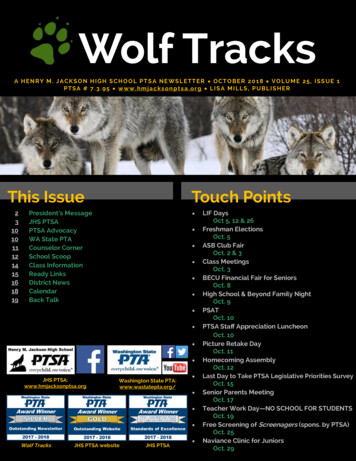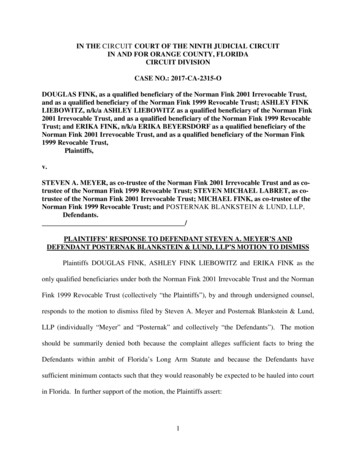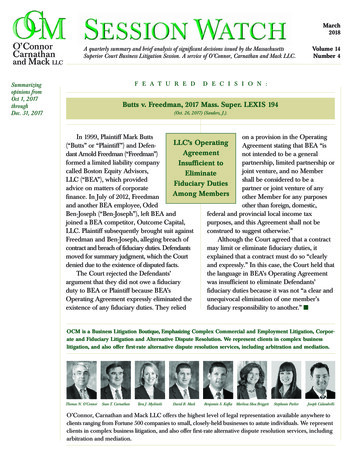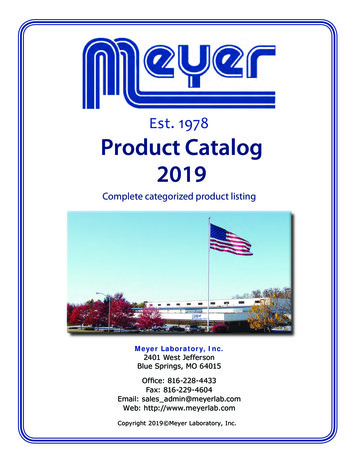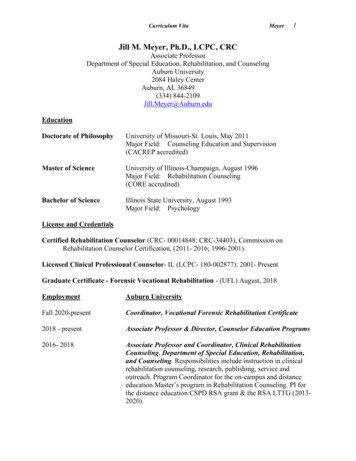
Transcription
Curriculum VitaMeyer1Jill M. Meyer, Ph.D., LCPC, CRCAssociate ProfessorDepartment of Special Education, Rehabilitation, and CounselingAuburn University2084 Haley CenterAuburn, AL 36849(334) 844-2109Jill.Meyer@Auburn.eduEducationDoctorate of PhilosophyUniversity of Missouri-St. Louis, May 2011Major Field: Counseling Education and Supervision(CACREP accredited)Master of ScienceUniversity of Illinois-Champaign, August 1996Major Field: Rehabilitation Counseling(CORE accredited)Bachelor of ScienceIllinois State University, August 1993Major Field: PsychologyLicense and CredentialsCertified Rehabilitation Counselor (CRC- 00014848; CRC-34403), Commission onRehabilitation Counselor Certification, (2011- 2016; 1996-2001).Licensed Clinical Professional Counselor- IL (LCPC- 180-002877). 2001- PresentGraduate Certificate - Forensic Vocational Rehabilitation - (UFL) August, 2018EmploymentAuburn UniversityFall 2020-presentCoordinator, Vocational Forensic Rehabilitation Certificate2018 - presentAssociate Professor & Director, Counselor Education Programs2016- 2018Associate Professor and Coordinator, Clinical RehabilitationCounseling, Department of Special Education, Rehabilitation,and Counseling. Responsibilities include instruction in clinicalrehabilitation counseling, research, publishing, service andoutreach. Program Coordinator for the on-campus and distanceeducation Master’s program in Rehabilitation Counseling. PI forthe distance education CSPD RSA grant & the RSA LTTG (20132020).
Curriculum VitaMeyer22011-2016Assistant Professor and Coordinator, Rehabilitation Counseling,Department of Special Education, Rehabilitation, andCounseling. Responsibilities include instruction in rehabilitationcounseling, research, publishing, service and outreach. ProgramCoordinator for the on-campus and distance education Master’sprogram in Rehabilitation Counseling. PI for the distanceeducation CSPD RSA grant & the RSA LTTG (2013-2020).2009- 2011University of Missouri- Missouri Institute of Mental HealthResearch Associate Faculty. Responsible for the day-to-daymanagement of federal grant evaluations; hire, train and supervisedata collectors. Manage human subjects’ compliance with HS-IRB.Responsible for overall management of program evaluations,including data collection, participant tracking, and follow-upassessments. Manage database(s); clean and analyze data.Complete federal and local evaluation reports. Present and publishprogram evaluation data and reports. Assist with federal grantapplications for future funding.Grants Administrator (2005-2009). Procure and administersponsored grants for MIMH, including, knowledge of federalregulations and sponsor requirements, networking and makingcontract arrangements. Provide sponsor related advice andinformation regarding federal procedures, sponsor expectations,and budget development for multimillion dollar, multi-year grants.Grants and Contracts Specialist (2001-2005). Responsible for thegrowth and administration of grants and contracts for threeresearch and two support divisions at MIMH. Research andidentify federal and local initiatives in efforts to explore policy,conduct research, and provide services to the constituents ofMissouri.Challenge Unlimited, Inc.Vice President of Human Resources, Rehabilitation CounselingServices (1999-2001). Responsible for the management andsupervision of community based rehabilitation services for a 24million agency including: Centralized Intake, VocationalEvaluation, Student Transition Services, Supported Employment (3programs), Transitional Work Services Program, and PlacementServices. Responsible for reporting annual rehabilitation outcomemeasures; Write grants and monitor contracts.2001 - 20091996 - 2001Director of Vocational Evaluation (1996-1999). Manage anddevelop evaluation services; Developed transition services forstudents; Manage evaluation staff and conducted admissionscreenings of new applicants for rehabilitation services. Conductall vocational evaluation assessments and reports.
Curriculum VitaMeyer3Journal PublicationsTuttle, M., Yordy. M., Meyer, J. M. & Kartovicky, L. (2020). What factors influence perceptionsabout Animal-Assisted Therapy? Journal of Creativity in Mental Health,doi: 10.1080/15401383.2020.1848681.Morano, S., Flores, M. M., Hinton, V. M., & Meyer, J. M. (2020) A comparison of concreterepresentational-abstract -integrated fraction interventions for students withdisabilities. Exceptionality, 28(2),77-91.Flores, M., M., Moore, A. J., & Meyer, J. M. (2020). Teaching the partial products algorithmwith the concrete-representational-abstract sequence and the strategic instruction model.Psychology in the Schools, 57(6), 946-958. doi: 10.1002/pits.22335Flores, M. M., Hinton, V. M., & Meyer, J. M. (2020). Teaching fraction concepts using theconcrete-representational-abstract sequence. Remedial and Special Education,41(3), 165175. doi.org/10.1177/0741932518795477Park, J., Meyer, J. M., Portela, L., & Hinton, V.M. (2019). Autonomy and uncertainty inemployment for Emerging Adulthood. Journal of Forensic Vocational Analysis, SpecialIssue: Transition, 19(1), 25-34.Meyer, J. M., Hinton, V. M., Park, J., Portela, L, Fleming, C., Derzis, N., & Weaver, S. (2019).An exploration of Emerging Adulthood, self-esteem, well-being and VocationalRehabilitation Services. Journal of Applied Rehabilitation Counseling, 50(4), 286- 299.doi: 10.1891/0047-2220.50.4.286Meyer, J. M., Kashubeck-West, S. & Portella, L. (2018). Two Revised Measures of Coping forIndividuals with Late-Deafness. Rehabilitation Research, Policy, and Education, 32(1),66-76.Curtis, R. S., Hall, A., Weaver, S., & Meyer, J. M. (2018). Personal and collective disabilityidentity development. Journal of Human Development, Disability, and Social Change,24(1), 7-20.Shippen, M.E., Meyer, J.M., Derzis, N., & Gage, C. (2017). Career thoughts of male offendersre-entering society using Cognitive Theory Assessment. Journal of CorrectionalEducation, 68(2), 3-16.Derzis, N., Meyer, J., Curtis, R.S., Shippen, M.E. (2017). An analysis of career thinking andcareer interests of incarcerated males. Journal of Correctional Education, 68(1), 52-70.Meyer, J. M., Hinton, V. M., & Derzis, N. (2015). Emerging adults with disabilities: Theory,trends, and implications. Journal of Applied Rehabilitation Counseling, 46,3-10.
Curriculum VitaMeyer4Meyer, J. M. & Kashubeck-West, S. (2015). Coping and Late-Deafness: An examination of twomeasures. Rehabilitation, Research, Policy, and Education, 29(4), 371-390. .doi: 10.1891/2168-6653.29.4.371Meyer, J. M, & Shippen, M. (2015-on line). The Career Thoughts Inventory and incarceratedmales: A preliminary psychometric review. American Journal of Criminal Justice,doi: 10.1007/s12103-015-9303-9Meyer, J. M (2015). Counseling self-efficacy: On-campus and distance education students.Rehabilitation Counseling Bulletin, 58, 154-164.Hinton, V., & Meyer, J. M. (2014). Emerging adulthood: Resilience and support. RehabilitationResearch, Policy and Education, 28(3), 143-157. doi:10.1891/2168-6653.28.3.143Meyer, J.M. & Kashubeck-West, S. (2013). Well-being of individuals with late-deafness.Rehabilitation Psychology, 58(2), 124-136.Derzis, N. C., Shippen, M. E., Meyer, J. M, Curtis, R. S., Houchins, D. E. (2013). Careerinterests of incarcerated men: The influences of generational differences. Journal ofOffender Rehabilitation, 52, 393-406.Kashubeck-West, S., & Meyer, J. (2008). The well-being of women who are late-deafened.Journal of Counseling Psychology, 55, 463-472.Szymanski, D. M., Kashubeck-West, S., & Meyer, J. (2008). Internalized heterosexism:A historical and theoretical overview. The Counseling Psychologist, 36(4), 510524.Szymanski, D. M., Kashubeck-West, S., & Meyer, J. (2008). Internalized heterosexism:Measurement, psychosocial correlates, and research directions. The CounselingPsychologist, 36(4), 525-574.Szymanski, D. M., Kashubeck-West, S., & Meyer, J. (2008). Internalized heterosexism:Clinical implications and training considerations. The Counseling Psychologist,36(4), 615-630.Book Chapter PublicationsMeyer, J. & Kashubeck-West, S. (2011). The well-being of emerging adults who aredeaf. In D. Zand & K. Pierce (Eds.), Risk and resilience: Adaptation in context of beingdeaf. Springer Publishing, New York, NY.
Curriculum VitaMeyer5Book Review PublicationsMeyer, J. (2013). Improving skills, services, and research through cultural competence:A review of Deaf mental health care. PsycCRITIQUES, August, 2013.Other PublicationsMeyer, J. M., Derzis, N. C., Shippen, M. E., & Houchins, D. E. (2017). A model ofinterdisciplinary training for rehabilitation counselors and special educators. 15th HawaiiInternational Conference on Education. Honolulu, HI.Manuscripts Under ReviewMeyer, J.M., Hill, J., Harrell, L., Ausmus, JC, & Worthey, B. (ready to submit). Chronic Illness,.Disability, and Sexual Health.Manuscripts/ Projects Under DevelopmentHill, J. & Meyer, J.M. (In progress). Quality of life, coping, adaptation, and adjustment forindividuals with Ehlers-Danlos Syndrome and Hypermobility Spectrum Disorders.Rabren, K., Tuttle, M, Yordy, M., & Meyer, J.M. (In progress). Educators’ School Counselorsand School Nurses’ knowledge and attitudes of Diabetes Mellitus in the schools.Cornish, M. A. & Meyer, J. M. (In progress). Attributes of forgiveness in individuals with spinalcord injury.Meyer, J.M., & Yamamoto, K. (In progress). Effects of trauma and disability identity onpsychosocial outcomes for individuals with spinal cord injury.PresentationsAuburn UniversityYordy, M., Tuttle, M., Meyer, J.M., Kartovicky, L. (December, 2019). What factors influenceperceptions about animal assisted therapy in school settings? Round Table. Associationfor Creativity in Counseling Annual Conference. Tampa Bay, FL.Tuttle, M., Yordy, M., Meyer, J.M., Kartovicky, L. (November 2019). School counselors andschool nurses: Collaboration to bring canines to school. Alabama Counseling AssociationAnnual Conference. Montgomery, AL.
Curriculum VitaMeyer6Yordy, M., Tuttle, M., Meyer, J.M., Kartovicky, L. (October, 2019). What factors influenceperceptions about animal assisted therapy in school settings? Auburn University FacultyResearch Symposium. Auburn, AL.Cornish, M., Meyer, J. M., Harris, LV, & Hunter, E. (August, 2019). Forgiveness and SpinalCord Injury. American Psychological Association Annual Conference. Chicago, ILMeyer, J. M., Park, J., Portela, L., & Hinton, V.M. (March, 2019). Emerging adulthood,individualized placement services and WIOA. American RehabilitationCounseling Association/American Counseling Association Annual Conference. NewOrleans, LA.Fleming, C., Derzis, N., Meyer, J. M., Hinton, V. M., Dotson, C. (March, 2019). Preemployment transition services: A theoretical and conceptual approach to servicedelivery. Alabama Transition Conference XXVIII Annual Conference. Auburn, AL.Hall., A., Weaver, S., Meyer. J. M., Curtis, R. (February 2019). Disability Identity Symposium.Institute for Human Rights Annual Conference 2019, Birmingham, AL.Tuttle, M., Tyler, J., Appling, B., & Meyer, J. M. (November 2018). Collaboration acrosscounseling disciplines. Alabama Counseling Association Annual Conferences.Birmingham, AL.Meyer, J. M., Hinton, V. M., Derzis, N. C., Portela, L., & Weaver, S. (April, 2018). Emergingadulthood: Factors that predict resilience. American Counseling Association, AnnualConference 2108, Atlanta, GA.Portela, L. & Meyer, J. M. (April, 2018). Counselor Education and addressing the needs of theLGBT community: Are we doing enough? American Counseling Association, AnnualConference 2018, Atlanta, GA.Meyer, J. M., & Fleming, C. (October, 2017). Pre-employment transition services: A theoreticaland conceptual approach to service delivery. National Council on RehabilitationEducation, Annual Fall Conference 2017, Washington, DC.Meyer, J. M. & Weaver, S. (April, 2017). Counseling Self-efficacy: On campus and distanceeducation students. American Counseling Association, Annual Conference 2017, SanFrancisco, CA.Derzis, N. C., Meyer, J.M., Shippen, M.E., Curtis, R. S., & Mautz, K.E. (2016, April).Examination of Disability Status, Recidivism, and Career Information of IncarceratedMales. National Council on Rehabilitation Education, Annual Conference 2016,Manhattan Beach, CA.
Curriculum VitaMeyer7Curtis, R. S., Meyer, J. M., Hall, A., & Weaver, S. (2016, February). Personal and collectivedisability identity. Cross-Cultural Counseling and Education Conference for Research,Action, and Change, Annual Conference 2016, Savannah, GA.Derzis, N. C., Meyer, J. M., & Shippen, M.E. (2016, February). Transition and emergingadulthood: Training counselors to improve outcomes for young adults with disabilities.Cross-Cultural Counseling and Education Conference for Research, Action, and Change,Annual Conference 2016, Savannah, GA.Barnes, E., & Meyer, J. M. (2015, October). Reattribution training: A veteran-focusedintervention. National Council on Rehabilitation Education/ RSA/ CSAVR AnnualConference 2015, Washington, DC.Flores, M. M., Lakin, J. M., & Meyer, J. M. (2015, October). Concrete-representational-abstractinstructional sequence: Accumulating evidence from single case designs usinghierarchical linear modeling. Council for Learning Disabilities, Annual Conference2015, Las Vegas, NV.Derzis, N., Meyer, J. M., Curtis, R., & Shippen, M. (2015, April). An analysis of career thinkingand career interests of incarcerated males. National Council on RehabilitationEducation, Annual Conference 2015, Manhattan Beach, CA.Meyer, J. M., Hinton, V. M., Derzis, N., Weaver, S. (2015, March). Emerging adulthood:Theory, characteristics, and trends. Auburn State Rehabilitation Council (SRC) quarterlymeeting, Montgomery, AL.Meyer, J. M. (2015, March). Coping and adaptation to chronic conditions: Parkinson’s Disease.Auburn Parkinson’s Disease Support Group monthly meeting, Auburn, Al.Derzis, N., Meyer, J. M., Shippen, M. E. (2015, March). Intersection of generations andvocational interests of male prisoners. Auburn University Annual Outreach Symposium2015, Auburn, AL.Barnes, E. F. & Meyer, J. M. (2014, November). Preliminary Hypotheses and a TreatmentOption for Veteran Attributions and Recovery. National Council on RehabilitationEducation Annual Conference 2014, Washington, DC.Meyer, J. & Kashubeck-West, S. (2014, August). Revised measures of coping in adults with latedeafness. American Psychological Association National Conference 2014, Washington,D.C.Hinton, V. Meyer, J. M., & Derzis, N. (2014, March). Emerging adulthood, resilience and socialsupports. National Council on Rehabilitation Education Annual Conference 2014,Manhattan Beach, CA.
Curriculum VitaMeyer8Derzis, N., Curtis, R., Meyer, J. M., & Shippen, M. (2014, March). An analysis of careerthinking and career interests of incarcerated males. National Council on RehabilitationEducation Annual Conference 2014, Manhattan Beach, CA.Meyer, J. M. (2014, February). An examination of the factor structure of the Brief COPE: Apersonality based coping measure, in individuals with acquired hearing loss. AmericanPsychological Association, Rehabilitation Psychology (Div. 22) Annual Conference2014. San Antonio, TX.Meyer, J. & Kashubeck-West, S. (2013, August). Factor structures of coping for Individualswith Late-Deafness. American Psychological Association National Conference 2013,Honolulu, HI.Meyer, J.M, & Shippen, M. (2013, April). Examination of the psychometric properties of theCareer Thoughts Inventory for use with inmates. National Council on RehabilitationEducation Annual Conference 2013, San Francisco, CA.Meyer, J. & Hinton, V. (2013, April). Emerging adulthood and implications for youth withdisabilities. National Council on Rehabilitation Education Annual Conference 2013, SanFrancisco, CA.Meyer, J. (2013, March). Psychological well-being, adaptation, and coping in rehabilitationresearch. Research presentation for AU doctoral course in Counseling Education.Auburn, AL.Meyer, J. (2012, September). Chronic illness and disability. Research presentation for AUdoctoral leadership course. Auburn, AL.Johnson, C., Meyer, J., & Fisher, S. K. (2012, November). New horizons for evidence-basedcounseling in Auditory Rehabilitation. American Speech-Language Hearing AssociationAnnual Conference 2012. Atlanta, GA.Meyer, J. (2011, September). Adaptation to chronic illness and disability & EmergingAdulthood. Research presentation for AU doctoral leadership course. Auburn, AL.Meyer, J. & Kashubeck-West, S. (2012, August). Coping, adaptation, and psychological wellbeing of Individuals with Late-Deafness. American Psychological Association NationalConference 2012. Orlando, FL.Meyer, J., & Iarussi, M. (2012, March). Psychosocial outcomes and Motivational Interviewingfor individuals with acquired hearing loss. Auburn University, Counseling in Audiology,Auburn, Al.Meyer, J. (2012, March). Emerging adulthood, transition, and well-being. Alabama TransitionConference XXII. Auburn, AL.
Curriculum VitaMeyer9Meyer, J. (February, 2012). Psychometric considerations in testing. A learning institute: Bestpractices for vocational evaluation. Alabama Department of Rehabilitation Services,Auburn, AL. (Invited Presentation)Meyer, J. (2012, February). Coping, adaptation, and psychological well-being of individualswith acquired hearing loss. Auburn University, Audiology, Auburn, AL.Meyer, J. (2011, November). Counseling individuals with disabilities. Clinical presentation.Auburn, University, AU Counseling Program, Auburn, AL.Meyer, J. (2011, September). Stress, coping and the psychological well-being of individuals withlate-deafness. Research presentation for AU doctoral leadership course. Auburn, AL.University of MissouriMartin, A. & Meyer, J. (2011, March). Missouri Extreme Recruitment Grant: Family finding, kinconnections and permanency- (Program and Evaluation Review). Federal GranteeConference: Washington, D.C.Martin, A., & Meyer, J. (2010, May). Missouri Extreme Recruitment Grant: Family finding, kinconnections and permanency- (Program and Evaluation Review) . Federal GranteeConference: Washington, D.C.Meyer, J. (2010, March) Stress, coping and the psychological well-being of individuals who arelate-deafened. Dissertation research presentation. Missouri Institute of Mental Health, St.Louis, MO.Panel Discussion. (2009, October). Missouri Extreme Recruitment Grant—Family finding, kinconnections and permanency. Missouri Coalition of Children’s Agencies, Osage Beach,MO.Daily Stokes, S., Hile, M. G., & Meyer, J. (2009, April). Improving coordination across systems:A multi-method approach. The 17th National Conference on Child Abuse and Neglect,Atlanta, GA.Szymanski, D., Kashubeck-West, S., & Meyer, J. (2008, March). Internalized Heterosexism (3).International Counseling Psychology Conference, Chicago, IL.Meyer, J., & Kashubeck-West, S. (2006, August). The psychological well-being of individualswho are late deafened. American Psychological Association Convention, New Orleans,LA.Meyer, J. (2004, October). Solution Focused Therapy. Lecture in Theories of Counseling course,University of Missouri-St. Louis, St. Louis, MO.
Curriculum VitaMeyer10Meyer, J. (2004, September). Completing federal grant applications for the National Institutes ofHealth. Missouri Institute of Mental Health, St Louis, MO.Meyer, J. (2004, May). Grant writing and administration. Missouri Department of MentalHealth Spring Conference, Lake of the Ozarks, MO.Meyer, J., & Evans, C. (2003, May). Grant writing and administration. Missouri Department ofMental Health Spring Conference, Lake of the Ozarks, MO.Meyer, J, & Evans, C. (2003, June) Grant writing and administration. Missouri Institute ofMental Health Continuing Education Conference, St. Louis, MO.Meyer, J. (2000, February). Conducting community based vocational evaluations. Illinois StateConference on Mental Retardation, Champaign, IL.Meyer, J. (1999, November). Conducting community based vocational evaluations. MidwestIllinois Regional Rehabilitation Conference, Mt. Vernon, IL.Teaching and InstructionAuburn UniversityFall CoursesIntroduction to Rehabilitation (RSED 3020)Examine society's attitudes and values toward persons withdisabilitiesReview basic rehabilitation history and conceptsReview the different models of disabilityProvide an understanding of the impact of social and attitudinalfactors on individuals with disabilities Research Methods in Rehabilitation (RSED 7240/7246)Identify, define, and apply fundamental research design conceptsRecognize specific strengths and limitations of different researchdesignsReview the literature in a specific area of rehabilitation counselingDevelop a rationale and design for a specific empirical researchproject in rehab counselingApply research methodology skills to critically analyze researchstudies and evaluate the usefulness of the resultsMedical Aspects of Disability (RSED 5010/5013/6010/6016)Understand the utility and definition of medical terminologyUnderstand a selection of medical specialties and how they interactwith the rehabilitation practitioner in working with CIDUnderstand body systems, function, and the effect of illness ordisability on the individual and vocational adjustmentLearn and understand commonly encountered conditions seen invocational rehabilitation.
Curriculum VitaSpring Courses Meyer11Research Design in Counseling (COUN 8300)Identify ethical and legal issues in counseling research Identify and select appropriate research methodology and designFormulate research questions appropriate for professional research andpublicationIdentify and operationalize research topicsCreate research designs appropriate to quantitative and qualitativeresearchWrite grant proposals appropriate for research Rehabilitation Counseling Techniques (RSED 7300/7316)Development of professional identityReview self-determination, autonomy, & advocacyDevelop counseling skills and techniquesReview counseling settings and theoriesReview ethics and multicultural issues Summer Courses Advanced Assessment I In Rehabilitation (RSED 7130/7136)Discuss the history of testing for special populationsReview testing concepts such as reliability, validity, and normsCover appropriate psychometric tests for vocationalconsiderations, such as personality assessment, vocational interesttesting, aptitude testing, achievement, and intelligence assessmentDetermine the strengths and weaknesses of various testsDoctoral Seminar: Disability Culture & Philosophy (RSED 8030)Understand the history and future of disability rightsIdentify, define, and describe implications of various models ofdisabilityIdentify/describe the processes of adaptation and identity dev.Understand multiple minority identity development,marginalization, discrimination & prejudiceDigest and critique disability culture and identityAdvanced Theories in Rehabilitation (RSED 7940/7946)Develop understanding of evidence-based practices (EBP)Increase awareness of EBP applicable to rehabilitation counselingIdentify, define, and describe implications of various models ofEBP in rehabilitation counselingDevelop counseling skills and techniques of EBP; in general CBT,& more specifically MI, SBFT, and IPS.Rehabilitation Distance Education Practicum (RSED 7916)Increase awareness of rehabilitation practice & settings
Curriculum Vita Occupational, Career, & Placement Information(RSED 6210/6216)Increase awareness of occupational information & resourcesUnderstand use of occupational resources in rehabilitationIncrease knowledge of human resources practicesIncrease awareness of career theory and placement informationIncrease ability to perform job matching Placement & Career Development in Rehab (RSED 5220)Increase awareness of career theory and placement informationUnderstand use of occupational resources for rehab placementsIncrease knowledge of the local labor marketIncrease ability to perform job matchingUniversity of Missouri – St. LouisIndividual Inventory (COUN). University of Missouri- STLTaught and supervised professional development labs onintelligence, vocational and assessment skills January-May, 200512Provide instructional experiences in community settingDevelopment of professional identityIncrease understanding of self-determination, autonomy, &advocacyDevelop counseling skills and techniques Summer, 2007MeyerReviewed principles of assessment and administrationGuided student progress through assessments and coursematerialsProvided lectures on accommodations for individuals withdisabilitiesAssistant Lecturer, (COUN) Personal and ProfessionalDevelopment of Counselors. University of Missouri, STL Instructed and supervised professional development labs oncounseling skills Graded research papers and transcripts of counseling sessions Prepared and provided lectures on Solution Focused Therapy,Counseling Individuals with Disabilities, and Counseling OlderAdults
Curriculum VitaMeyer13August-December, 2004Assistant Lecturer, (COUN) Personal and ProfessionalDevelopment of Counselors. University of Missouri, STL Instructed and supervised professional development labs oncounseling skills Graded research papers and counseling transcription Prepared and provided lectures on Solution Focused Therapy,Counseling Individuals with Disabilities, and Counseling OlderAdultsSummer 2003 & 2004Group Counselor, Introduction to Group Counseling. Universityof Missouri, STL Facilitated group sessions Facilitated understanding of group process Taught group techniquesJanuary-May, 1999August-December, 1998Lewis and Clark Community CollegeCareer Development. Lewis and Clark Community College,Godfrey, IL Taught college vocational course for undergraduate studentswith disabilities Prepared and delivered lectures to a diverse student populationwith disabilities. Independently monitored student progress through assessmentsand course materials Provided accommodations as neededCareer Development. Lewis and Clark Community College,Godfrey, IL Taught college course for undergraduate students withdisabilities. Prepared and delivered lectures to a diverse student populationwith disabilities. Independently monitored student progress through assessmentsand course materials Provided accommodations as needed
Curriculum VitaMeyer14Grant Experience and Funding ActivityAuburn UniversityExternal Funding- my contribution to external funding at AU is slightly over 5 millionMeyer, J. M., (2020). RSA Innovative Rehabilitation Training Grant: Auburn UniversityVocational Evaluation Forensic Certificate. Rehabilitation Services Administration.A five-year project totaling 2,069,649.00. Role: Principle Investigator. Funded.Meyer, J. M., Park, J., & Hill, J. (2020). Preparing Rehabilitation Counselors for the Challengesand Benefits of the Rehabilitation Profession. Rehabilitation Services Administration.A five-year project totaling 1,000,000.00. Role: Principle Investigator. Funded.Yordy, M, Tuttle, M., & Meyer, J.M. (2019). Improving Health Outcomes by IncorporatingAnimal Assisted Therapy in the K-12 School Setting. Clinical Nurse Specialist Institute(CNSI). 5,000; Role: Co-Investigator. Funded.Meyer, J. M., (2019). Innovative Rehabilitation Training Grant. Rehabilitation ServicesAdministration. A five-year project totaling 2,200,000.00. Role: Principle Investigator.Not Funded.Yordy, M, Tuttle, M., & Meyer, J.M. (2019). Animal assisted therapy in schools.Human Animal Bond Research Institute (HABRI). 50,000 Not FundedMeyer, J. M., (2015). Preparing Students for the Challenges and Benefits of the State VR System.Rehabilitation Services Administration CSPD Grant. A five-year project totaling 1,000,000.00. Role: Principle Investigator. Funded.Meyer, J. M., Curtis, R., Rawlins, L., Derzis, N., & Fleming, C. (2014). Preparing RehabilitationCounselors for the Challenges and Benefits of the Rehabilitation Profession.Rehabilitation Services Administration. A five-year project totaling 1,000,000.00.Role: Principle Investigator. Funded.Meyer, J. M., Shippen, M. E., Derzis, N. (2014). Transition and Emerging Adulthood Methods:Training Rehabilitation Counselors as Related Service Providers (TEAM). Office ofSpecial Education Programs. A five-year project totaling 1,250,000.00Role: Principle Investigator. Not funded.Meyer, J. M., & Shippen, M. (2013). Second chance act adult mentoring and transitionalprogram for inmates. U. S. Department of Justice. A 2-year project totaling 250,000.Role: Evaluators for J. F. Ingram Community College. Not funded.Shippen, M., & Meyer, J.M. (2013). Second chance act adult mentoring and transitionalprogram for inmates. U. S. Department of Justice. A 2- year project totaling 250,000.Role: Evaluators for Healthy You agency. Not funded.
Curriculum VitaMeyer15Shippen, M., & Meyer, J.M. (2012). Model demonstration project on promoting reentrysuccess. U.S. Department of Education. A 2.5 year demonstration project totaling 300,000. Role: Evaluators. Not funded.Martin, E.D., & Brigman, H. (2011). Consumer satisfaction surveys and the Alabamastrategic plan for supported employment. Alabama Department of RehabilitationServices. (Program Evaluation of Triumph Services, Inc.) Role: ConsultantRenner, S. & Hill, D. (2011). Institute for training on health care transitioning. AlabamaCouncil on Developmental Disabilities. A three-year project through the Center forDisability Research and Service, totaling 450,000. Role: Consultant. Not fundedInternal FundingHill, J. & Meyer, J.M. (2020). Quality of Life, Coping, Adaptation, and Adjustment forIndividuals with Ehlers-Danlos Syndrome and Hypermobility Spectrum Disorder.”Auburn University College of Education Seed Grant. Co-Investigator. 2,000. FundedPark, J., Meyer, J.M., Hinton, V.M. (2020). An understanding of emerging adults withdisabilities on their career development through an exploration of emerging adulthood.Auburn Un
Auburn University . 2084 Haley Center . Auburn, AL 36849 (334) 844-2109 . Jill.Meyer@Auburn.edu. . Council for Learning Disabilities, Annual Conference 2015, Las Vegas, NV. . Member Auburn University - SERC Distance Education Equity Committee . 2015-Present

